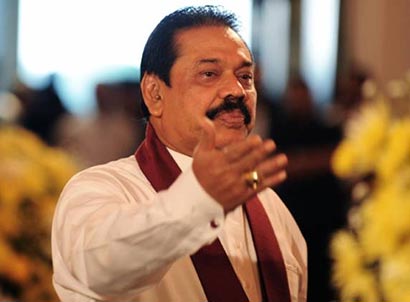Sri Lankan president seeks Supreme Court nod for third term

Sri Lanka President Mahinda Rajapaksa has asked the Supreme Court to determine if there is any constitutional obstacle to his becoming president for a third term, something the top lawyers’ association says he can not do.
Rajapaksa and his family have a tight grip on Sri Lanka’s economy and on politics which critics characterize as an unusually personalized system of government. He has also been criticized over human rights standards.
The government has said it will hold an early election amid some indications its popularity is fading but to secure another term as president Rajapaksa must ensure the constitutional path is clear.
Rajapaksa abolished a two-term presidential limit in 2010 but the Bar Association says the limit still applies to him as the amendment was brought in during his second term, after he won under the provisions of the earlier constitution.
The Supreme Court said on Wednesday Rajapaksa had asked if he could proclaim his intention to seek another term when he completes the fourth year of his second six-year term on Nov. 19, the court’s registrar said in a letter to the Bar Association.
He has also asked the Supreme Court to determine if there was any impediment to him being elected for another term, the registrar said in the letter, a copy of which was seen by Reuters.
The registrar, M.M. Jayasekera, told the Bar Association to inform its member of the president’s request, and if they had any points to make, they should submit them in writing.
“Our position is he can’t contest a third term,” Upul Jayasuriya, president of the Bar Association, told Reuters.
“We have made written submissions and we have also asked the Court to give us on opportunity to make oral submissions in open court,” he said.
Rajapaksa, 68, came to power in 2005 and retained the presidency in 2010 on a wave of popularity after the military defeat of ethnic Tamil rebels in 2009, ending a 26-year civil war.
The Bar Association argues that he can not contest for a third term without a parliamentary vote to make the constitutional amendment scrapping the two-term limit retrospective. Then it must be approved by a referendum.
But legal experts backing Rajapaksa say he can call an early election after four years in office, and serve again as president if he wins.
Government spokesman Keheliya Rambukwella said last month a presidential election would be held in January, nearly two years ahead of schedule.
Rajapaksa has been accused of rights abuses and nepotism. He insists any relatives in parliament are there because people elected them and not because he chose them.
His ruling United People’s Freedom Alliance (UPFA) party won a local election in the southeastern province of Uva in September but with sharply lower support.
(Reuters)
Latest Headlines in Sri Lanka
- Johnston Fernando, two sons and others further remanded until February 13, 2026 January 30, 2026
- Sri Lanka raises daily wage of plantation workers to Rs. 1,750 January 30, 2026
- Sri Lanka expands Internal Affairs Units to 250 more state institutions January 30, 2026
- Three arrested over Rs. 17 Million Lanka Sathosa garlic scam January 30, 2026
- Businessman arrested over Rs. 30 Million money laundering case linked to former minister January 30, 2026



I wish he gets the ‘nod’. I wish he go for a referendum instead of going to the court. That will be the proper authorization and silence the incessant Western and NGO criticisms bound to come in his way if he gets the ‘nod’. The should go for a public referendum to change the constitution that would allow anybody to stand for presidency as long as the person gets 2/3 of the votes if he/she wants to be elected as the president after the completion of the second term. What the current SL need is a steady and strong guiding hand for another 10-12 years and MR can provides it.
UJ is a tool of the West in their pay, to obstruct MR from seeking a 3rd Term.
Under the Sec 18 Amendment he has a right to seek a 3rd term as it applies to the current incumbent. UJ and ilk are trying to split hairs with false arguments and wasting money to call for referendum.